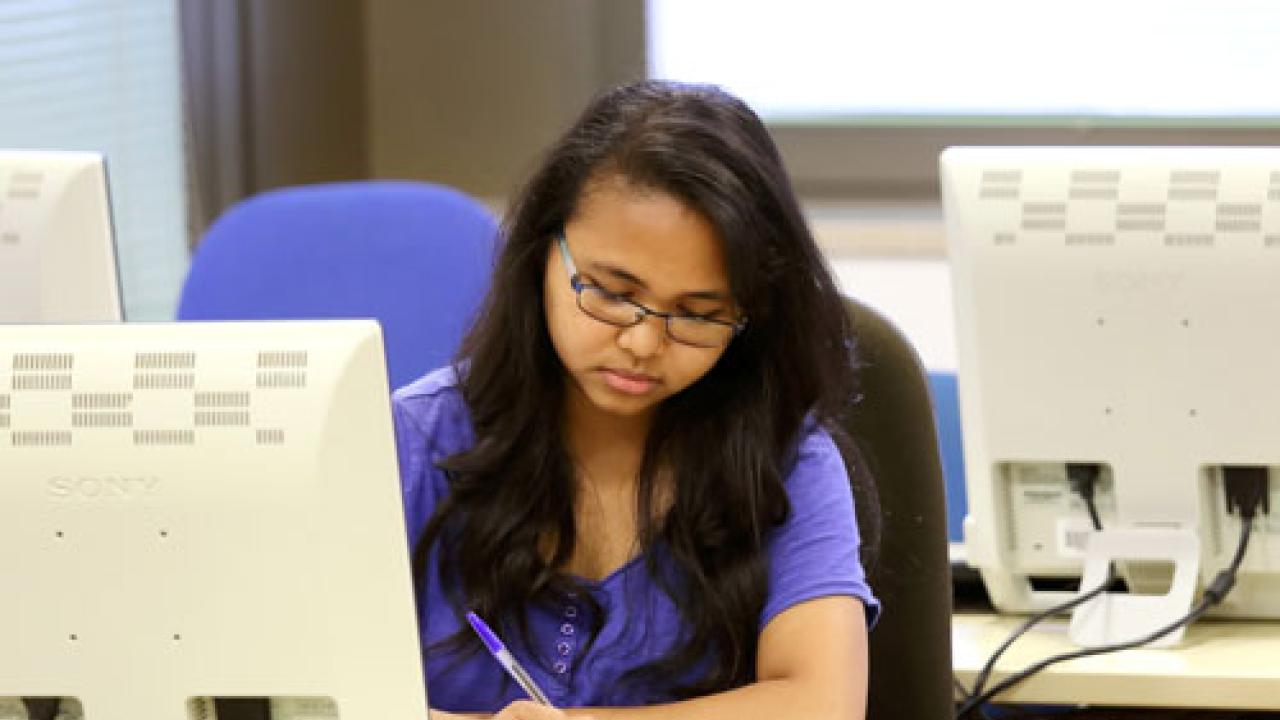
The teaching of mathematics at the University of Antananarivo in Madagascar follows quite a theoretical focus, mainly on algebra. But this stress on symbols is not enough to satisfy the curious mind of a young, talented mathematician like ICTP Diploma student Vahatra Rabodonandrianandraina. Her hunger for knowledge led her first to a master’s program in South Africa and then to ICTP, where she is sharpening the research and study skills she needs to pursue a doctoral degree.
"I love mathematics, the logical thinking, the process," she says. "But even in high school, I still had kind of a kid's mind," she smiles, "When the math got too abstract, I always wanted to know what the application for this was."
The ICTP Diploma student did her undergraduate studies at Antananarivo, graduating as one of the top mathematics students in Madagascar. Her skill and obvious potential prompted one of her professors to recommend her for a structured master's program in South Africa, where courses covered all manner of math and physics areas. It was here where she was introduced to the field of dynamical systems, and she immediately saw how the field could satisfy her curiosity to connect math with real-life applications. “You can use dynamical systems to study several areas of physics, as well as the spread of disease, ecological health, and cognitive development,” Vahatra explains.
Vahatra's relocation to South Africa to further her studies is not an unusual move for someone whose native country only offers a master's program in pure mathematics. That may soon change, however, as the number of students studying science has increased dramatically in recent years: enrollment in tertiary education in science more than doubled from 2000 to 2011. While life sciences dominate, many fields are growing and gaining students. The percentage of female university students has risen over 50%, and 35% of full-time researchers are women, one of the highest percentages of female researchers among Sub-Saharan African countries.
Despite the encouraging statistics and increase in student interest in science, Madagascar is still reeling from five years of political turmoil that affected the country from 2009-2014. An attempted coup and international sanctions hurt the economy, and the effects are still being felt, in addition to the widespread poverty already affecting the majority of Malagasy.
Often, it takes personally knowing a scientist to inspire more time-consuming, advanced study in the face of these circumstances. Vahatra was encouraged to continue studying mathematics by her family, most of whom are scientists themselves: her father trained as a physicist, and two of her three brothers are also physicists. "Almost every physics and math student has at least one parent who is in science," says Vahatra. "Young Malagasy don't want to study abstract things, they want to study things where just after two or three years they will get a job." The separation from her family to study in South Africa and then in Italy was a big step. "But my family understands that this is a great opportunity for me and my career," says Vahatra. "I know that they are proud of me, so that keeps me willing to do my best and to go further."
At ICTP, Vahatra has thrived, thanks to the Centre’s high-quality teaching as well as the multidisciplinary offerings. The way mathematics is taught in Madagascar and other developing countries is different from countries with more developed research communities, Vahatra explains. "I had already taken all of the courses taught at ICTP, but here I really see the difference," she says. "In our country, you are taught if you have such a problem, do this, but here, you know why you do this. Here you don't have to remember it by heart, you remember it automatically because you understand why this theorem is the way it is. It's fantastic — it's like you're reading the story behind the theorem."
Vahatra’s education journey will continue after ICTP: in the autumn she will begin a PhD studying dynamical systems at the University of Amsterdam. She is committed to returning to her home country in spite of the difficulties facing those who pursue careers in science there. Positions in academia are hard to find, and strikes and delayed salaries complicate the lives of teachers, the most common position for Malagasy with advanced training in science. But she's determined to strengthen mathematics in Madagascar.
"I would like to make a connection between my home university and ICTP, which is most known for taking students from developing countries," Vahatra explains. "If you are in a developing country, few people will study something like algebra. Because we are poor they will think it will not help them for their future. I want to show them that math and other abstract studies are useful and very important."
--Kelsey Calhoun
















